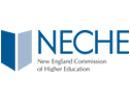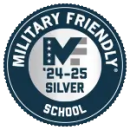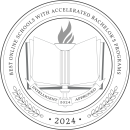Take PSYC-100
Get Started in Applied Psychology
The online Bachelor of Arts in Applied Psychology offers a unique approach to the study and practice of psychology. This program underscores the practical application of knowledge to make meaningful contributions in a range of settings. Throughout the program, students will apply psychological principles and techniques to tackle challenges in both personal and professional contexts. Graduates of the BA in Applied Psychology have the foundation for career opportunities in a variety of fields, including: advocacy, corporate wellness, and community leadership.
Finish your program faster with credit for prior learning and experience.
Differentiate your degree and get your resume noticed with a certificate. Speak with your advisor for information.
Advance Your Career in Applied Psychology
Having a bachelor’s degree can significantly improve your job prospects in the short term as well as your long-term career potential. Whether you are interested in a career as a social worker, in human resources, criminal justice or other areas of social services where skills and knowledge around human behavior and human development are key, a bachelor of arts in applied psychology can get you on your way.
This program aligns with the academic guidelines for undergraduate programs by the American Psychological Association. There are many careers that benefit from a background in psychology, however some careers require licensure which entails further education beyond a bachelor’s degree. Please refer to your state licensing board for specific information.
Program Curriculum
Having a bachelor’s degree can improve your long-term career potential. Learn more about Champlain's 100% online Applied Psychology degree, designed for your schedule.
Champlain's online applied psychology curriculum encompasses the top skills needed by today's professionals. Graduates of the program are required to complete the following courses.
Psychology Core Courses (21 credits)
Additional Required Courses (15 credits)
Applied Advanced Electives (12 credits)
General Education Courses (42 credits)
General Electives (30 credits)
In this course, students will explore broad, foundational knowledge in psychology, including its history, major theorists and a survey of psychology subfields such as developmental, cognitive and social psychology. Students will also describe and assess the role of ethics and social responsibility in the study and application of psychological theory and practices.
How did we get here? How do infants develop into teenagers then into adults, and how do those adults change as they age and mature? Students will examine the strengths and weaknesses of the major theories and thinkers of human development from psychological, physiological, and sociocultural perspectives. Throughout the class, students will consider theories to ask practical questions about education, mental health, and public policy.
Prerequisites
Human beings are social creatures, and social psychology is the study of how humans form (and dissolve) groups. Students will use multiple frameworks, including cognitive, behavioral, sociocultural, and psychodynamic, for thinking about relationships, prejudice, and intra- and inter-group conflicts. Then students will apply those frameworks to interpret real-world problems and situations.
Prerequisites
Take PSYC-100
Problem-solving, memory, learning, and patterns of thinking are central to the study of cognitive psychology. Students will read about and conduct experiments that show how it is that human beings have adapted to live in a complex environment. These ideas will be applied to practical questions like how do individuals and groups make decisions? How do we practice good informational hygiene? How can we best learn and adapt to a changing world, and help others do the same?
Prerequisites
Take PSYC-100
What does it mean to be normal? That challenging question is at the center of this course about how we think about what patterns of thoughts, feelings, and behaviors are considered disordered. Students will explore the ways we currently think about psychological disorders, with a particular focus on understanding how different cultures address different behaviors. Students will explore the causes of psychopathology, including biological, developmental, learned, and social, with a particular emphasis on the places where our understanding is uncertain.
Prerequisites
Take PSYC-100
In this course, students will question the premise that personality is fixed and trait-like. They will explore personality theories including through a critical cultural lens and ask how much our personalities change over our lives--with time and depending on context (including cultural context). How can we understand challenging personality traits, whether our own or someone else's? Students will synthesize those theories to interpret research that questions the ways in which culture influences professional and personal growth, as well as psychological treatment.
Prerequisites
Take PSYC-100
What is the relationship between physical and mental well-being? How do mind and body interact to create our sense of self? Students will delve deeply into the role that psychology can play in addressing acute and chronic disease states, stress, and well-being. Examples and case studies will include healthcare environments such as hospitals and clinics, large and small business contexts, and personal development.
Prerequisites
Take PSYC-100
Students will learn about how social science research is conducted, including the research methods (quantitative and qualitative) typically used in the social sciences. Students will assess the alignment of various research methods and the research goal and ultimately practice planning, conducting, analyzing and interpreting research. Additionally, students will critically analyze existing research through the lens of ethics and social justice.
Students will learn how to create conditions for successful conflict engagement, a necessary skill for any professional. The course focuses on the foundational capacities to remain calm and connected with oneself and others. In this state students can access helpful ideas and responses and be their best selves regardless of environment. Improving facility for conflict creates stronger relationships and reduces fear. By the end of the course, students will understand that disagreement and difference can become a source of personal and interpersonal growth.
This course explores the intersections among race, class, gender and categories of difference. Students will explore theories of difference in their relation to topics such as education, work, poverty, and the criminal justice system. They will recognize how those intersections and structural inequalities show up in their chosen career fields and their civic and personal lives. Students will critically analyze inequality as a system rather than as an aggregation of individual identities.
Prerequisites
PSYC-100 or SOCI-110 or CRIM 100
Ethics refers to accepted standards of right and wrong that prescribe what humans ought to do in various contexts, typically in relation to rights, obligations/duties, benefits to society, fairness, consequences, and virtues. In this course, students will explore both theoretical and practical dimensions of ethics in order to 1) define ethics and identify ethical positions and principles, 2) critically reflect on how ethics impacts individual and collective responsibility, decision-making, and action, and 3) apply ethics to the personal, civic, and professional contexts.
Prerequisites
ENGL-110
Students in Social Sciences programs will synthesize their program-specific knowledge and apply that perspective to a real-world problem or opportunity within the scope of their academic program. Students will create an experiential project of their own design that responds to the need of either a specific organization or the field of professional study. The project may be designed based on indirect or direct evidence, supporting a project idea that addresses a real-world problem or opportunity.
Prerequisites
12 credits or fewer left to complete the degree
Choose two of the following 400 level PSYC courses, plus two of any 200+ level CRIM or SOCI courses.
How do we understand the causes and consequences of criminal behavior? After developing a thorough understanding of the multiple roles that psychology can play in predicting, understanding, and responding to criminal, dangerous, or problematic behavior, students will use case studies and applied examples to critically analyze the theory, evidence, and practical methods of forensic psychology in multiple contexts, including law enforcement, the courts, the educational system, and individual and family treatment. Students should be aware that this course includes discussion of real criminal behavior.
Prerequisites
PSYC 100 and at least 9 additional credits of Psyc, and/or Sociology and/or Criminal Justice
Organizational psychology is the study of human behavior in a workplace setting, with the goal of improving the functioning, well-being and performance of an organization and its employees. From a psychology-informed perspective, students will analyze what makes an effective workplace and impactful group leaders and group members, and will explore group/team dynamics, organizational structures, workplace culture, and leadership. Students will investigate these concepts in the context of real-world case studies and examples.
Prerequisites
PSYC 100 and at least 9 additional credits of Psyc, and/or Sociology and/or Criminal Justice
Students in this advanced seminar will engage in a comprehensive exploration of the foundations and applications of counseling psychology and social work. Students will explore, compare, and contrast the multiple roles, workplaces, and circumstances within which counselors and social workers provide care, with the goal of preparing to enter one or more of those fields. Students will apply research skills and findings to real-world circumstances through the use of case studies and roleplay.
Prerequisites
PSYC 100 and at least 9 additional credits of Psyc, and/or Sociology and/or Criminal Justice.
In addition to the following requirements, students must also complete 3 Credits of a General Education Elective (Any ARTS, COMM, CRIT, ECON, ENGL, HIST, MATH, PHIL, PSYC, SCIE, SOCI, MKCM 120, CRIM except CRIM-225)
This course introduces students to the foundational concepts needed to communicate effectively in writing for academic study and professional development. Students will also learn to read critically to evaluate an author's message. Students will be introduced to rhetorical modes and their role in the development of written communication. Students will also learn how to use revision strategies to create written communication that meets its intended purpose for its intended audience
This course builds on students' proficiency in the writing process and rhetorical modes to introduce the use of sources in written communication. Students will practice information literacy as they learn to determine information needs from sources, develop effective search strategies, and incorporate sources in written communication, legally and ethically.
Prerequisites
Complete ENGL-100
Starting with a frame of human communication as a dynamic system of interactions in which people make choices that impact their relationships, other people, and themselves, students will define theory-informed communication concepts and processes, and critically examine how they apply to everyday life across a variety of contexts. Students will reflect on how the theory, concepts and processes apply to their own lives in becoming competent communicators who are knowledgeable, skilled, and versatile.
This course examines the principles of effective small group interaction. Students will analyze group development stages and small group roles. They will identify and evaluate communication skills that enhance small group cohesion and problem-solving. Students will explain how conflict affects group processes and compare face-to-face versus digital collaboration environments. These skills prepare students to participate effectively in group settings across academic, professional, and community contexts.
Students will learn and apply critical inquiry skills to analyze persuasive communication created by others and to develop persuasive communication/arguments of their own to solve problems in professional, civic, social, and personal contexts. Specifically, students will learn to recognize fallacies in logic; apply inductive and deductive reasoning strategies to the interpretation and development of persuasive communication; evaluate the validity of sources; and develop logically sound persuasive communication. Students will explore the roles of self-awareness, empathy, and ethics in the context of critical inquiry and the development of arguments.
Prerequisites
Complete ENGL-110.
This course is an historical overview, and examination of the evolution of digital, film, and print media, and their functions. Students will identify and analyze contemporary problems of the media such as the legal, social, economic and psychological implications of their relationships with society. They also will examine the ways in which marketing and PR professionals utilize the mass media channels to reach their intended target audiences.
This course explores the complex and evolving relationship between human beings and technology. Through a multi-disciplinary approach that draws on fields such as sociology, psychology, philosophy, and history, students will examine the ways in which technology has shaped human culture, identity, and values, as well as how humans have influenced and continue to influence the development, adoption and use of technology.
This course introduces students to basic statistics for data literacy. With a focus on exploring real-world data, students will interpret numerical information and utilize the tools necessary to complete the entire statistical process: designing a study; gathering, organizing, and analyzing sample data; and making inferences about a population. Students will demonstrate data-driven decision-making and effective communication of numerical data.
Introduces students to the biochemistry and physiology of nutrition and exercise. Emphasis will be placed on human body systems such as musculoskeletal, digestive, respiratory and circulatory, and their relationship to nutrition and fitness. Students will also study the biochemistry of energy conversion as it relates to exercise physiology. Laboratory sessions are designed to reinforce, by a hands-on approach, the principles discussed in lecture. Course includes two laboratory hours per week.
Students will develop the ability to apply scientific methods to understand the natural world, to identify scientific aspects of daily life, and to evaluate the quality of scientific information based on its source and the methods used for its generation.
In this course, students will gain an introduction to classical mechanics and learn about motion, force, energy, and momentum. The course covers vectors, scalars, and coordinate systems, as well as kinematics in one and two dimensions, Newton's Laws of Motion, circular motion, and kinetic energy and work. Students also learn about potential energy and energy conservation, collision theory, rotational motion, moment of inertia, torque, rotational dynamics, and angular momentum.
This course will introduce students to major streams of social justice thought, including historical social justice movements, theoretical problems having to do with social equality, personal freedom, marginalization, and stigmatization, and the ways in which civic and professional communities respond to these issues.
With pressure and release, a window opens and closes, recording light on a sensor. The simple action captures the instinct, judgement, and skill of the person behind the lens. This class will begin a study of the art and craft of photography. Students will develop their vision and their understanding of how to achieve it. Solid skills will be learned and many doors will be opened.
A survey of the continuing change experienced in art since the 15th century. Students will examine how an image is achieved as well as the significance of the subject represented. Individual inquiry concerning the nature of art is encouraged.
Students learn to appreciate films through the critical analysis of various elements of mise-en-scene, cinematography, editing and sound. The course introduces the conventions of classical Hollywood cinema, considers the work of one major director (auteur), and surveys selected international and independent films. Students view and discuss films each week.
Students in the course will explore the cultural history of the music genre broadly referred to as rock. Students will explore the social, economic and political contexts that are influenced by and that influenced each style in the United States. By listening, watching, reflecting upon, discussing and writing, students will explore how music takes on meaning, personally, and culturally. Topics and themes include the relationships between and among gospel, country, funk, folk, disco, rap and hip hop; the role of business and technology in those relationships, and political or transgressive elements of rock music.
Specific application of common tools for writing in the working world. Students will be instructed in rhetorical strategies of professional writing including style, report formats, editing, document design, and integration of visual aids. Students will complete a semester-long writing project; oral and written reports associated with the process of problem-solving within the project will be included.
Prerequisites
ENGL-112 or COR-125
Students will learn how to create conditions for successful conflict engagement, a necessary skill for any professional. The course focuses on the foundational capacities to remain calm and connected with oneself and others. In this state students can access helpful ideas and responses and be their best selves regardless of environment. Improving facility for conflict creates stronger relationships and reduces fear. By the end of the course, students will understand that disagreement and difference can become a source of personal and interpersonal growth.
In this course, students will explore and apply writing principles and techniques to effectively interpret and write technical workplace materials. Students will enhance and gain skills to communicate business and technical information by producing instructions, describing processes, applying document design elements, creating and integrating illustrations, researching and writing proposals and formal reports, and presenting content for decision-makers.
This course provides students with a comprehensive overview of the American criminal justice system as comprising three essential components: law enforcement, the court system and corrections. Students will recognize that the field of criminal justice is interdisciplinary and they will outline and discuss the historical foundation of the criminal justice system. They will also explore social and ethical dimensions as they review real-world case studies.
In this class, students will explore how social relationships, groups, societies and culture develop and change over time. From a sociological theory foundation and employing the sociological imagination, students will examine the impact of social structures, institutions, and systems on individual lives. Students will apply sociological research methods to investigate sociological phenomena in their own lives.
Additional Program Information
Graduates of the applied psychology bachelor's online degree program will demonstrate the following industry-specific skills, knowledge, and competencies.
- Identify and describe the foundational theories and concepts in psychological science and its subfields, including social, developmental, cognitive, psychology disorders, and personality.
- Use scientific reasoning to apply the tools and techniques of psychological science to personal and professional challenges.
- Analyze the ethical principles of psychological science and apply them to personal, professional, social, and societal conflicts and challenges, with the goal to address complex issues while respecting cultural context.
- Communicate psychological concepts clearly and concisely to address specific audiences with purpose, and to facilitate effective interactions with people of different backgrounds in a variety of professional settings.
- Apply psychology theories, concepts, and processes to evaluate specialized areas of study and practice such as mental health counseling, criminal justice settings and organizational psychology.
Design your own degree and enhance its value and focus by adding a certificate. Adding a certificate allows you to develop specialized skills, strengthen your résumé, and tailor your education to align with career goals. Choose from the undergraduate or graduate certificates on this page.
Note: To earn a certificate, you must speak with your advisor first. You must be officially enrolled in the certificate program before you complete the required courses in it — coursework completed prior to enrollment cannot be applied later, and certificates may not be added retroactively. Careful planning with an advisor is essential to ensure all policies and timelines are met.
Our admissions team seeks to admit students who:
- Demonstrate a solid academic foundation - a minimum 2.5 GPA is our recommendation, though exceptions may be made on a case-by-case basis for those who demonstrate a potential for academic success in other ways.
- Possess an aptitude for success in an online learning environment.
- Exhibit the ability to make a positive contribution to the Champlain College Online community.
To learn more about submitting transcripts, or requirements for home-schooled students, those educated abroad or returning students visit our Undergraduate Admissions page.
Our transfer credit evaluation team works hard to ensure you get the transfer credits you deserve, from a variety of sources including prior college credits, work experience and training, military training and experience, and more. Our goal is to help you graduate from Champlain College Online as quickly and affordably as possible. Visit our Transfer Credit Options page to learn more.
This program aligns with the academic guidelines for undergraduate programs by the American Psychological Association. There are many careers that benefit from a background in psychology, however some careers require licensure which entails further education beyond a bachelor’s degree. Please refer to your state licensing board for specific information.
Champlain College Online's social sciences faculty, led by Department Chair Dr. Janet Morrison, are expert practitioners in the field. Their industry expertise ensures that our curriculum is aligned with the needs of employers, and reflects the skills today’s social science professionals need for success. Classes led by our seasoned experts will give you real-world insight into the field, and create a rich community of career-focused learning.
Tuition & Costs
Online Undergraduate Tuition Fall '25 - Summer '26
Tuition & Costs
Online Undergraduate Tuition Fall '26 - Summer '27
* Alumni is defined, for this tuition rate, as any degree program graduate from Champlain College or Champlain College Online.
** Veteran rate effective Spring 2025, not retroactive
See the undergraduate cost of attendance and fees here
Affordability and Paying For Your Education
We provide a number of options to make your online education affordable, including preferred tuition for alumni, associate degree graduates, community college graduates, and military.
What Can You Do With a Degree in Applied Psychology?
Due to growing mental health awareness, as well as increased demand for wellness initiatives, professionals with psychology expertise are increasingly sought after. According to The American Psychological Association Monitor, there has been a notable rise in demand for such professionals. In addition, substance abuse, behavioral disorder, and mental health counselors are witnessing remarkable growth with an 18% increase, which surpasses the average job growth rate.
Note: There are many careers that benefit from a background in psychology, however some careers require licensure which entails further education beyond a bachelor’s degree. Please refer to your state licensing board for specific information.
Top Jobs for a BA in Applied Psychology Graduates
- Community Leader
- Human Resources Specialist
- Corporate Wellbeing Specialist
- Health and Wellness Coordinator
- Advocate

Why Champlain
Champlain Community
"I was living in Mexico during my program, and there was a major earthquake. My advisor heard about it and called me the next day to find out how I was. It's that kind of personal touch that really makes Champlain special."

Academic Excellence and Recognition

Regionally accredited by the New England Commission of Higher Education

Designated as a Military Friendly School for our commitment to the military community
Ranked among the best by Tech Guide for game design and computer science

Named the among the best schools with accelerated bachelor's degrees by Intelligent.com
Meet the Program Director
Janet Morrison, Ph.D.
- BS, Integrated Studies
- General Education Curriculum
About
Dr. Morrison has been with Champlain College since 2002, first as faculty; since 2013 as an Academic Advisor, and then as the Associate Director of Academic Advising. While in the Academic Advisor role, she also developed the role of student success coach, and contributed to the development of Champlain College Online's two orientation courses for new students: Introduction to Online Learning; and Introduction to Academic Integrity.
Her dedication to teaching excellence and students' lived experience in their classes began in graduate school at the University of Maine (M.A., Speech Communication), and Southern Illinois University (Ph.D., Speech Communication) and continued through several academic roles prior to continuing her career at Champlain College Online.

FAQs: Applied Psychology Degree
Champlain College Online’s applied psychology curriculum emphasizes real-world learning through case studies, applied research, and scenario-based assignments. You’ll develop skills in counseling techniques, behavioral analysis, and ethical decision-making for immediate application in professional settings.
Most students complete the program in three to four years, but your timeline may be shorter if you transfer previously earned credits. Champlain College Online offers multiple start terms and a flexible course schedule to help you finish at a pace that fits your life.
Champlain College Online stands out for its career-focused, competency-based curriculum and strong support for adult learners. The program blends psychological theory with practical skills, preparing you to work in fields like human services, case management, or behavioral health without needing a graduate degree to get started.
You May Also Be Interested In
Get Your Applied Psychology Program Guide
Learn what you can expect from our online bachelor's in applied psychology program.

Download Program Guide
I acknowledge that, by clicking the "submit" button, I am giving my express written consent to Champlain College and its representatives to contact me about educational opportunities via email, text, or phone, at the phone number above, including my mobile phone, using an automatic dialer, or pre-recorded message. Message and data rates may apply. I understand that my consent is not a requirement for enrollment, and I may withdraw my consent at any time.






